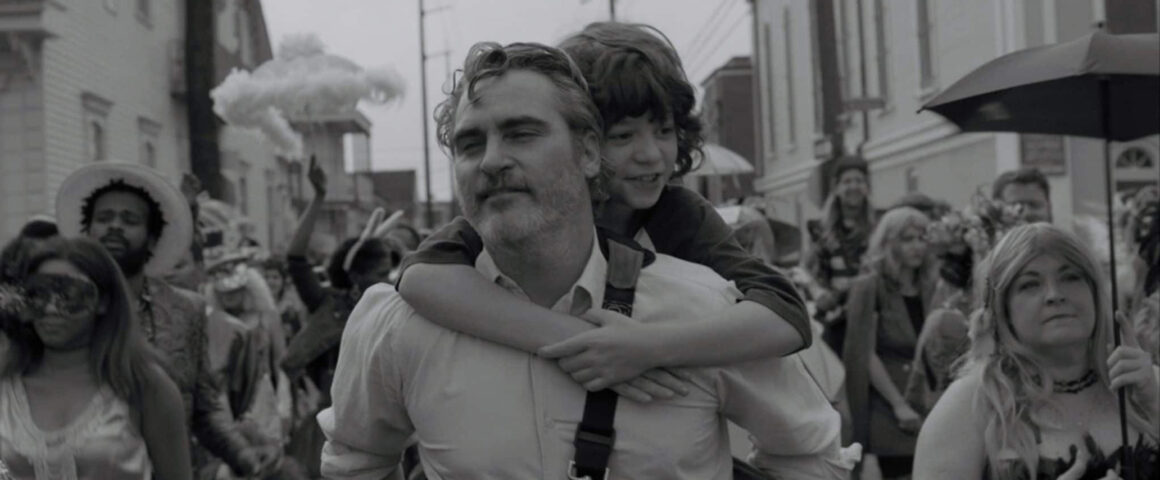If your children suggest that you operate within “your zone of resiliency,” you might want to look into what soap opera they’ve been watching, or whether they have gotten their hands on a convoluted movie script, the sort readily available in Mike Mills (“20th Century Women”) C’mon C’mon, a film inspired by Mills’ relationship with his own son that bounces between the tender and the insufferable. The film’s cutesy title is derived from the mouth of precocious nine-year-old Jesse (Woody Norman, “The Small Hand”) who tells his uncle Johnny (Joaquin Phoenix, “Joker”), a radio journalist, “You just have to come on, come on, come on, come on, come on,” presumably a movie reiteration of the saying “you just have to keep on keeping on” or some other poignant advice that suggests life’s obstacles can be overcome with just a little grit.
The scruffy looking, bearded Johnny travels to Los Angeles to take care of Jesse when the boy’s mother Viv (Gaby Hoffmann, “Wild”) is called away to care for her ex-husband Paul (Scott McNairy, “Frank”), being treated for mental health issues. Jesse is chosen to accompany Johnny on his travels around the country interviewing high school students about their view of the future and the film focuses on the opportunity for Johnny to appreciate and reach out to others, a trait in which he appears to be out of practice. As a single man unfamiliar with the minefield of parenthood, it is a relationship that will require more than a spoonful of sugar to make the medicine go down.
Shot in black and white to give it that documentary feel, the photography often creates a drab and spiritless atmosphere that seems at odds with the volatile events taking place in the film. Talking into a microphone in his hotel room in the opening scene in Detroit, Johnny rehearses the questions he will ask the students — how they feel about the cities where they live, their relationship with their families, and what makes them happy. He and Jesse will soon find out, however, that the young people they interview live in different worlds than them. They come from different backgrounds and offer a wide variety of messages, but their hopes for the future are limited by their circumstances and their daily struggle for life’s necessities.
While the student’s responses are forthright and sincere, unfortunately, Mills uses them as props for the main characters and the interviews do not probe as much as they might have. As Johnny approaches his brand new parenting responsibilities with good intentions (but also a bit of naïveté), past incidents with sister Viv come to the surface in their many phone calls and text messages. Viv offers some good advice to her brother about how to deal with the quirky Jesse when he becomes demanding. In one “game,” Johnny is put in a position where he has to support Jesse’s nightly game of pretending to be an orphan. This ritual demands that the adult he is with play the role of a foster parent answering questions about his dead relatives, a game that exceeds our normal understanding of odd behavior.
Jesse can be quite charming at times and abrasive and annoying at other times but his acting out with shows of temper and getting lost twice seems like overkill to stir our dormant emotions. The boy, who seems to be much older than his age, is very direct in his questions to Johnny, asking him “Why aren’t you married?” and often acts as if he is mentoring his uncle rather than the other way around. Though the film feels contrived, Phoenix delivers his usual solid performance and Norman is a young actor with a bright future.
Sister Viv is a welcome long distance companion who helps Johnny navigate his relationship with Jesse and, in Gaby Hoffman’s outstanding performance, is an easy character to identify with and care about. While the main characters show growth in the film, their interactions seem less like a bonding exercise than a therapeutic counseling session, an effect that robs C’mon C’mon of much of its authenticity.




'Movie Review: C’mon C’mon (2021)' has no comments